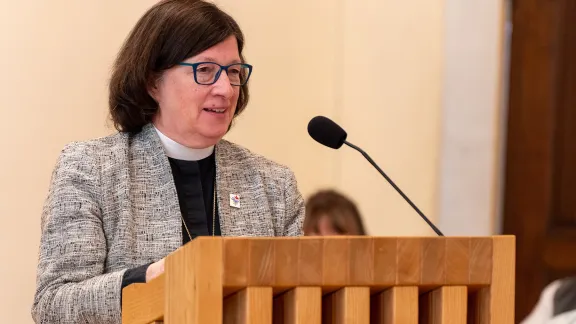Serving as the LWF Vice-President for North America, Evangelical Lutheran Church in America Presiding Bishop Elizabeth A. Eaton, discusses the importance of being a part of a larger Lutheran communion and the ELCA’s ecumenical commitment to “upend” Christian nationalism in the USA.

LWF Vice-President for North America Bishop Elizabeth A. Eaton. Photo: LWF/S. Gallay
Voices from the Communion: LWF Vice-President for North America, Presiding Bishop Elizabeth A. Eaton
(LWI) - Ensuring that her congregations understand that they are connected to a growing global Lutheran family is one way Bishop Elizabeth A. Eaton expresses her role as Lutheran World Federation (LWF) Vice-President for North America.
“LWF is a Lutheran movement that proclaims the grace and freedom we have in Christ in hundreds of languages,” said Eaton, Presiding Bishop of the Evangelical Lutheran Church in America.
In this Voices from the Communion, Eaton shares with us her early formation as a child, who influenced and inspired her, and her church’s ecumenical work in standing up against “Christian nationalism” in her country.
Tell us about your religious and spiritual upbringing as a child?
I was born April 2, 1955, and baptized May 8, 1955. My childhood began and was nurtured by the church because spiritual and religious formation was a part of our family’s life. Sundays meant Sunday school and worship, in the summers my brothers and I were marched off to vacation Bible school, and Sundays in Advent found us gathered around the Advent wreath in our home for scripture and treasured carols. At evening meals, we would take turns saying grace. My mother trained us to pass the dishes counterclockwise and pray clockwise. When it was my younger brother’s turn to pray, he took care to remember and thank every single person who had any part in the food on our table; from the farmer to the grocery store workers, and everyone in between. We teased him that ‘supper was getting cold!’
Who has been an influence on you?
There have been many, but when I was in high school my father suffered two heart attacks. This was in 1973 when open-heart surgery was relatively rare. My father was an honorable man who loved our family, was active in our parish and participated in our community. Why, I wondered, must a faithful and decent person suffer? This led me to write a list of questions first to my parish pastor, and later to our university’s campus chaplain. ‘Why do bad things happen to good people?’ I asked. ‘Why is there suffering in this world?’ ‘Where is God in all of this?’ Both my parish pastor, Rev. John Evans, and my campus chaplain, Rev. Cynthia Jarvis, gave me the space to ask these difficult questions and the grace for me to realize that questions and doubt were not the opposite of faith, but were a healthy, even if uncomfortable, part of faith. I have tried to model that in my ministry.
The ELCA has joined other American Christian leaders in the statement and petition "Christians against Christian Nationalism." What is this statement about?
Christian nationalism is anathema to the Gospel, and a misrepresentation of our theological tradition. As Christians, we must speak in one voice condemning Christian nationalism which is a distortion of the Gospel of Jesus and a threat to American democracy. The statement says, ‘Whether we worship at a church, mosque, synagogue, or temple, America has no second-class faiths. All are equal under the U.S. Constitution.’
On 6 January 2021, the United States watched Christian nationalism on display at the U.S. Capitol as violent attackers carried Christian symbols and used the language of our faith to subvert our democracy. The U.S. Congressional Committee reports ‘attention to the presence and potency of Christian nationalist and ideology, and names the ongoing threat it poses to our identity as a multireligious and democratic nation.’ The Lutheran church stands against Christian nationalism and commits itself to working together with other ecumenical partners to upend this distortion of the Christian faith.
As LWF Vice-President for North America, how do you encourage your people to stay connected to the LWF and to the Global Communion of Churches?
When I travel around the country, visiting synods and congregations, I remind them that they are connected to a larger and growing Lutheran family. With member churches on every continent, except Antarctica, the Lutheran World Federation is a Lutheran movement that proclaims the grace and freedom we have in Christ in hundreds of languages, and even the smallest LWF member church participates in life-changing relief work and advocacy. The Evangelical Lutheran Church in America, as an LWF member church, is a part of that transformative work.


